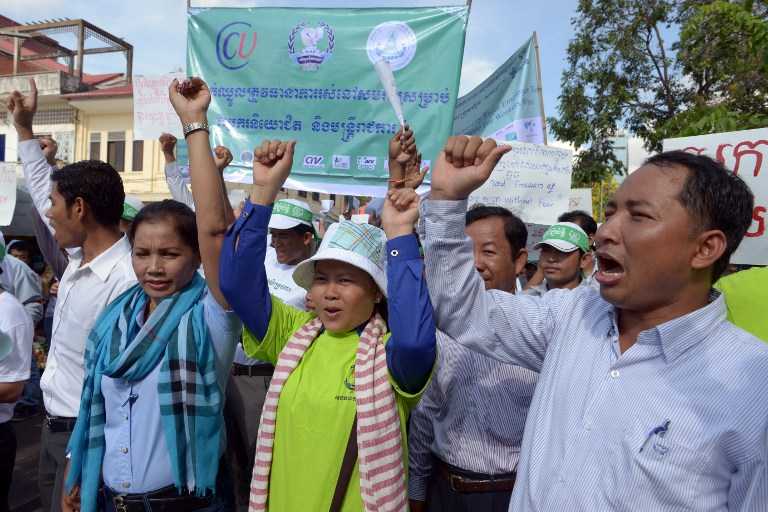
Cambodian workers and labor leaders at a May 1 rally (picture: Tang Chhin Sothy/AFP)
Early last week, 4,000 striking workers in Cambodia forced their way into a factory making clothes for the American brand Nike, briefly clashing with colleagues who had remained on the job.
The clashes came on the heels of several minor accidents at garment factories throughout Cambodia, which highlighted how concerns over workers' conditions in Asian sweatshops extend well beyond Bangladesh, where a factory collapse in Dhaka claimed more than 1,000 lives in late April.
But despite the clashes and the accidents, Church officials and labor activists say that workers' conditions are slowly improving in Cambodia, thanks to a more active workforce – and sometimes with the help of the Catholic Church.
“Around 70-80 percent of garment workers are unionized as opposed to four percent in Bangladesh,” says David Welsh, Cambodia country director for Solidarity Center, a US organization promoting workers' rights worldwide.
Many of these unions are “affiliated with government,” he cautions. “So you couldn't describe them as 100 percent democratic and independent. But still, union density is very high.”
Catholic missionaries have been closely following these developments.
“There is a movement among factory workers, asking for higher wages etc. This sector of the population, even if poorly educated, is very politically active,” says Father Ashley Evans, a Jesuit who teaches at the Royal University of Phnom Penh and is a member of the Jesuit Service Cambodia.
Evans underlines the huge social change taking place in around 400 garment factories that have sprung up around Phnom Penh in the last 15 years.
“There are 300,000 people working in factories outside the capital. This has a big effect on Cambodia: people from the countryside now have some money to bring home. Even if the salaries are poor, it is a big impact.”
Evans warns that this has not been a peaceful process. “There's a lot of violence, a lot of struggle, this is where the contrast between those who have power and those who haven't is taking place.”
Still, observers and activists agree that some progress has been made.
Early this month, possibly with an eye on upcoming elections at the end of July, the government of Prime Minister Hun Sen announced that the minimum wage would be raised from $62 to $80 per month, more than double that of Bangladesh.
“We want it to go to $150, because as salaries rise, so do rents and prices. In fact, this latest wage rise has already been eaten up by increased rents in Phnom Penh,” says Rong Panh, an official at Cambodia's Confederation of Unions (CCU).
A recent visit to the office of a CCU affiliate organization in central Phnom Penh showed the workers’ movement also has to face more mundane challenges: one of the Cambodian capital’s frequent power cuts shut down computers and air-conditioning, effectively stalling all activity for the morning.
But progress has been significant in recent months. “We have managed to unionize workers in eight new factories over the past year and a half. People are becoming more aware,” Rong says.
“The workers' bargaining power has increased. There are still a lot of issues – but compared to 10 to 15 years ago conditions in factories are better,” says Welsh, who points to improvements in the ventilation and clothing that factory workers receive.
Nevertheless, Cambodia is “still terribly hard work, with poor food and lodging.”
“It might not be like Bangladesh in terms of workers' security and conditions," but “being better than Bangladesh doesn't mean that it is a model [country]. There is still incredible room for improvement.”
Church observers hope that improvements made and ones that need to be made could also have a larger impact on Cambodian society.
“The hope for the future of this country is the workers' movement,” says Fr François Ponchaud, a veteran French missionary who was the first Westerner to report on the horrors of the Khmer Rouge regime in the 70s.
“They are in conditions similar to European workers in the 19th century. They have the capacity to make big changes.”
Another French missionary has looked into the struggles of Cambodia's workers even more closely.
Fr Pierre Laurent has been living for four years with a group of young factory workers north of Phnom Penh, after spending decades working in factories in France.
He says that as Cambodia's social landscape evolves, it is important to be “loving witnesses” of the sometime “violent” struggle of these young workers.
“It's not about dealing with them as we do with the poor,” he wrote in his latest letter to friends and supporters.
“We need to be active witness to the causes of their poverty. They are easily recognized and can be overcome.”


